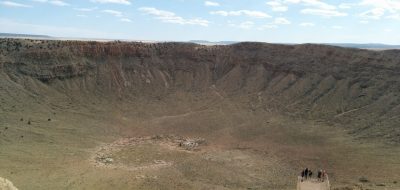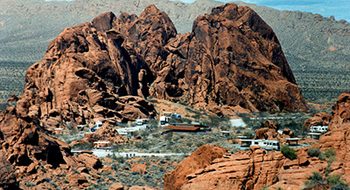By Bob Difley
In a previous post on efforts to keep California State Parks open I commended the good work by Ruth Coleman, her staff, and others to keep parks open by going the extra step, being creative, and thinking outside the box.
Well, some good news came today when Michael Harris, the acting chief deputy director for the state parks department, said that in addition to the agreements already in place to keep eleven parks open and operating, negotiations are underway with concessionaires and nonprofit groups to protect about 40 others.
This is good news for not only the residents and visitors to California, but also for all RVers that visit the state and stay in some of the most scenic state parks in the country (photo – Montagne de Oro State Park, 6 miles south of Morro Bay). The closures of the parks, historic sites, and beaches that would have closed due to budget shortfalls are now down to only 15 of the state’s 278 parks that will close on July 1st.
Originally I was on the fence about turning over state parks to private concessionaires, but the alternative of closing the parks instead swayed me over. However, I hope the deals were written so that both private concessionaires and the public are both happy with the results, and the parks will not turn “commercial,” but remain as natural and beautiful as they are today.
It is a brave deal on the part of the parks department and now we will see whether it works out, and whether it may serve as the model for other states in the same budget mess. We will all keep our collective fingers crossed.
Check out my website for more RVing tips and destinations and for my ebooks, BOONDOCKING: Finding the Perfect Campsite on America’s Public Lands (or for Kindle version), Snowbird Guide to Boondocking in the Southwestern Deserts (Kindle version), and 111 Ways to Get the Biggest Bang out of your RV Lifestyle Dollar (Kindle version).






Pingback: read this
Pingback: Penis Enlargement
Pingback: Free
Pingback: Hire Bouncy Castles
Pingback: Adidas Outlet Store
Pingback: stockings
Pingback: buy ibogaine online
Pingback: Organic Food
Pingback: dvd to galaxy note converter
Pingback: onebuckresume
Pingback: read this
Pingback: Mask
Pingback: Sum
Pingback: easton work injury lawyer
Pingback: restauracje w stargardzie
Pingback: katalog firm
Pingback: prezenty do domu
Pingback: レッドストーン RMT
Pingback: I've said that least 4345331 times
Chris
As a Californian I love camping in our state parks, especially at the beach. However, the current prices for state park sites is super expensive ($70 a night without hookups at some beaches!). I hope private companies do not price the campsites out of many peoples budgets.
truck repair melbourne
Thanks for the update on the parks, I am trying to figure out where I am going to take the family this summer!
Tomas DiFiore
The Solution Is In The Problem
Camping Reservation Fees (not the campsite fees but online and call center credit card banking fees – $9 for reservation and $10 for cancellation through ReserveAmerica – 2012) are my main focus, even Local District offices seem to be heading in the wrong direction. Having read the latest talked about report, from the California Legislative Analyst’s Office I feel another viewpoint is due.
The report lacks data or quantifiable criteria in key areas regarding:
1. attendance revenues, separated from camping reservations, length of stay, etc.
2. attendance revenues related to camping reservations, and length of stay
3. the amount of hours of volunteers – by what criteria were volunteer efforts cataloged, Was it just the daylight hours per program funding requirements and Park hours? What local group efforts, such as the many Coastal Ocean Groups that for decades have logged hours in cause-promotions, and celebration that brought people together to clean beaches, were included?
4. The cost to taxpayers due to Corporate Citizen clauses, Corporate Sponsor tax deductible contributions i.e., brand philanthropy and cause marketing promotions.
5. What amount of time in hours is spent by State Parks Employees and other State Officials researching Privatization data (mostly put together by Privatization Firms) – translating the privatization mantras – symposiums and luncheons, meetings, emails and phone calls, All contracts state that the responsibility for promotion and monitoring of public perception of the ‘benefits of privatization’ fall on the DPR or NPS.
6. What amount of taxpayer subsidies are going toward the programs that set up the transfer of Parks to (Privatization)?
Critical accountability in the Legislative Analyst’s Office report for all is needed.
The level of volunteer work is estimated to be worth over $20 million a year. (estimate assumes a labor cost of $21 per volunteer hour, based on an average of production and non-supervisory labor costs in the private sector) The DPR currently invests about 90,000 staff hours annually ($7 million) to train and operate its volunteer program. How much to train and operate the Corporate Privileges Program?
It is not proven that anything is more efficient, and there are no ‘lower fees’. Quite the opposite in fact. Privatized Concession Run Parks “pay a penny on the dollar” for credit card processing and bank fees – November 2, 2011, Warren Meyer – ReserveAmerica
Under the CA State Corporate Sponsorship agreements, all corporate involvement is tax deductible, thrice over. 1) General Fund Tax dollars for development of the ‘Parks for Perks’ business model 2) Tax dollars pay to make up for the corporate citizen’s allowable deductions, and 3) tax dollars will pay for the promotion, public acceptance and market monitoring, and protection of the business management of concession agreements.
In the classic film “Mr. Smith Goes To Washington” the parallels are perfect.
Reservation and Cancelation Fees: A Sustainable Green Fund For Parks & Non-Profits! Amazing that the State hasn’t figured out how to take the tickets without handing over the operation to Private Companies!
Tomas DiFiore, 30 years on the North Coast
Barry & Monique Zander
When families with kids are yelling while playing in camp sites near us, we let them know that we appreciate them taking their children camping in the parks. Yeah, many states have priced the parks over our budget, but we’re glad they are open and attracting the younger generations. Bob, thanks for keeping up with the situation and letting us know what’s happening.
roger
Bob,
I’m thinking that surely someone in state government asked the corporate sponsors what they expected in return for the support they’re providing. Maybe I missed the announcement of the deal that was made?
stephanie
Unfortunately, compared to National Parks and Forests, State Parks are very expensive especially for camping. Retirees on a fixed budget trying to still travel would surely pick one of the former that offer a substantial senior discount rather than pay the high prices at the State Parks. State Parks really need to offer a better senior discount if they want to attract the over 62 crowd.
butterbean carpenter
Howdy Bob,
Keep everything crossed that can be crossed that the ‘concessionaires’ are thinking public use of public lands and not “I rented this property and will use it for MY PROFIT!!!” Everything in California is supposed to be ‘profitable’, no matter who’s it is; volunteers do the work concessionaires make the $$$!!!